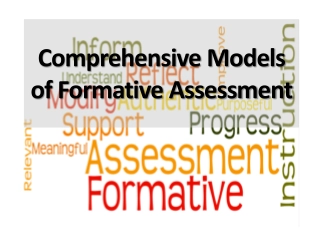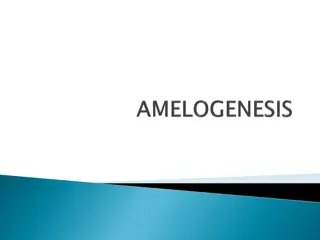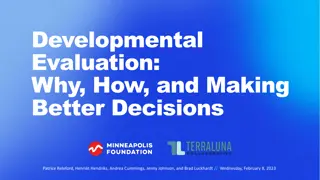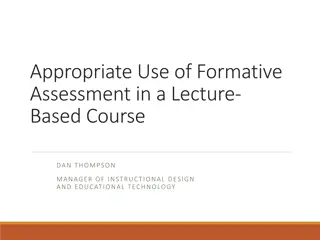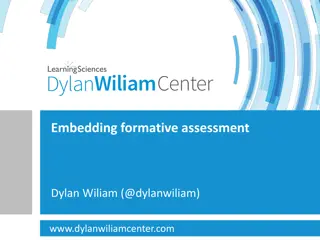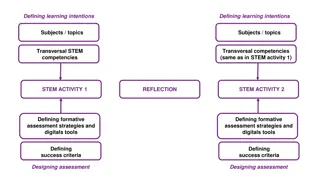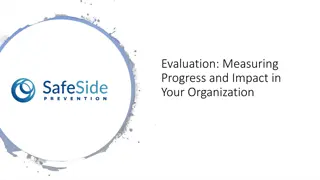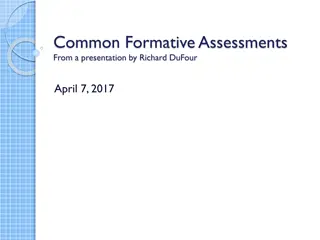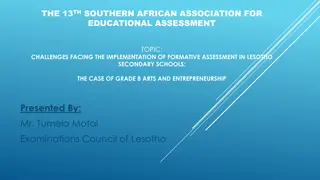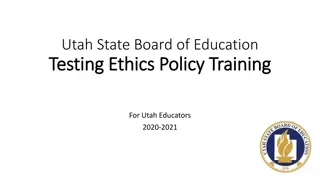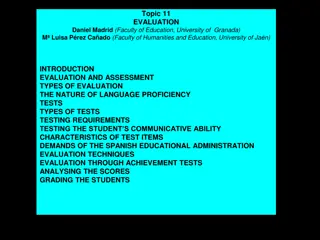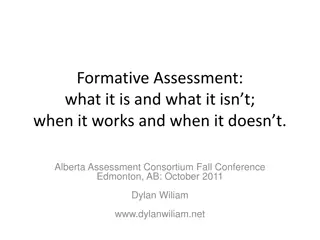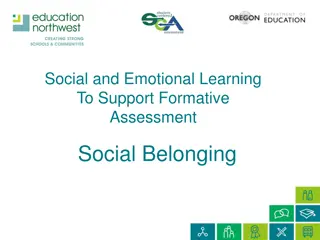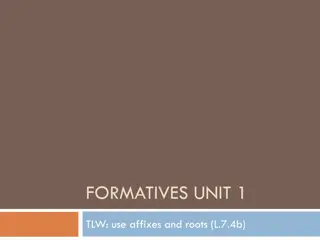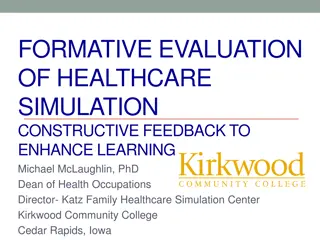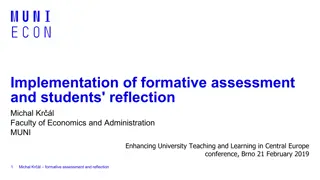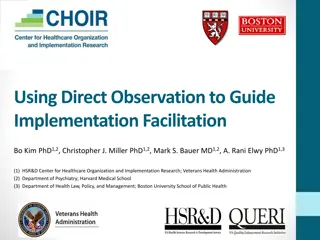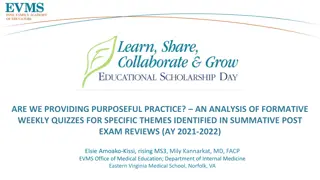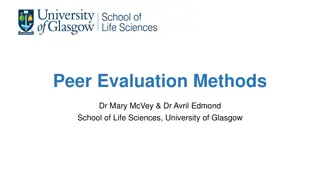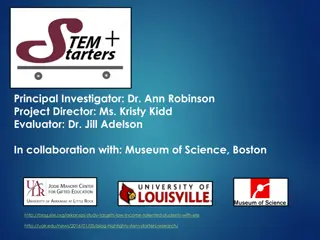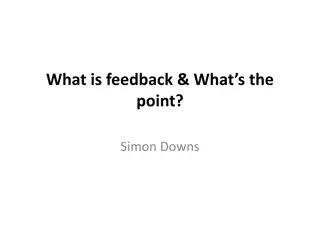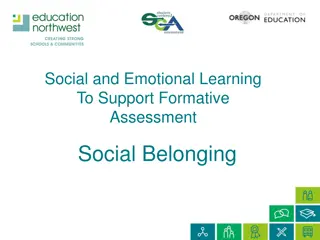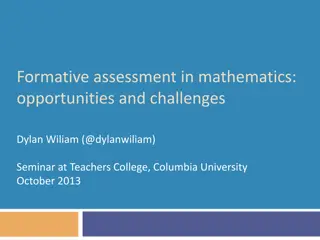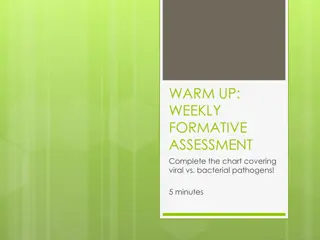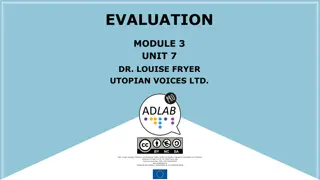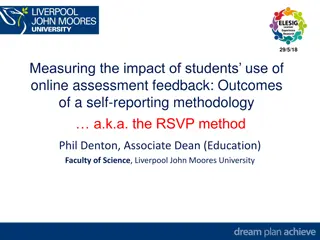Enhancing Learning with Formative Assessment Models
Explore comprehensive and theory-based models of formative assessment, such as the 7-Step Model and Tuttle's approach. Understand the importance of learning progressions to inform assessment strategies and foster student development. Discover practical techniques like pre-assessment, sharing learnin
2 views • 33 slides
Actions Emanating from the Evaluation of the Governance Reform
The evaluation of the governance reform within the WMO aimed to assess its alignment with strategic objectives, effectiveness in responding to societal needs, coordination efficiency, decision-making process, agility, and more. Evaluation criteria included relevance, design validity, effectiveness,
2 views • 13 slides
Universal Evaluation Framework: Simplifying Evaluation Processes
This session introduces the Universal Evaluation Framework (UEF) developed for evaluating QAA Scotland Enhancement Themes. Participants learn key evaluation questions, evidence capture, and the Theory of Change to enhance evaluation confidence. The QAA Scotland Evaluation Odyssey details historical
4 views • 14 slides
Implementing Blind Evaluation Pilot in HORIZON EUROPE: Key Facts and Process
HORIZON EUROPE is conducting a pilot on Blind Evaluation in the 2023-2024 work program to address biases in the research and innovation evaluation process. The pilot aims to assess the feasibility of blind evaluations in ensuring fairness and mitigating potential biases towards well-known organizati
9 views • 9 slides
Development Stages of Inner Enamel Epithelium
The life span of cells in the inner enamel epithelium can be divided into six stages: Morphogenic, Organizing, Formative, Maturative, Protective, and Desmolytic. Differentiation of ameloblasts occurs in various regions of the tooth germ. Amelogenesis, the enamel formation, takes place during the for
1 views • 48 slides
Developmental Evaluation for Better Decision-Making
Delve into the realm of developmental evaluation, focusing on its purpose, principles, and application in practice. Understand how developmental evaluation emphasizes real-time data collection for informed decision-making in complex systems. Learn about key principles such as developmental purpose,
1 views • 25 slides
Enhancing Student Learning Through Formative Assessment in Lecture-Based Courses
Formative assessment is a crucial tool for improving student outcomes in lecture-based courses. It allows educators to evaluate comprehension, identify learning needs, and adjust instruction to enhance student understanding. This article explores the methods, benefits, and implementation of formativ
2 views • 14 slides
Enhancing Evaluation Capabilities in Mongolia for Agenda 2030
The Mongolian Evaluation Network in collaboration with UNDP is working to integrate the 2030 Agenda into national strategies and plans, establish institutional coordination mechanisms, align budgets, and enhance data monitoring systems. Key stakeholders including government agencies, NGOs, and inter
0 views • 9 slides
Formative Assessment in Education
Exploring the significance of formative assessment in education through insights from renowned educators like Dylan Wiliam. Delve into the essence of learning, strategies for student achievement, and the need to prioritize formative assessment for effective teaching practices.
0 views • 54 slides
Evaluation in Education
Evaluation in education is a comprehensive term that encompasses measurement, testing, and qualitative examination of student behavior. It involves both quantitative and qualitative descriptions, along with value judgments. Differentiating from mere measurement, evaluation provides a deeper analysis
0 views • 28 slides
Effective Formative Assessment Strategies for STEM Learning
Explore formative assessment strategies and digital tools to enhance STEM learning outcomes. Develop success criteria, design assessments, and engage students in meaningful learning intentions. Utilize transversal STEM competencies to promote collaboration, problem-solving, critical thinking, and cr
0 views • 7 slides
Effective Evaluation Strategies for Organizational Progress and Impact
Learn how evaluation plays a crucial role in measuring progress and impact within organizations. Explore the importance of formative and summative evaluation, along with a detailed approach to clarify evaluation questions and reduce uncertainty. Discover key principles, metrics, sample questions, an
1 views • 7 slides
Maximizing Student Growth Through Common Formative Assessments
Key concepts around common formative assessments (CFAs) are highlighted in this presentation, emphasizing the importance of shared understanding, aligning assessments with standards, and supporting student growth. The content delves into the purpose and benefits of CFAs, outlining criteria for effec
0 views • 13 slides
Challenges of Formative Assessment Implementation in Lesotho Secondary Schools: Grade 8 Arts & Entrepreneurship
Arts and Entrepreneurship (A&E) in Lesotho secondary schools face challenges in implementing formative assessment. Introduced in 2017, A&E aims to develop creative and entrepreneurial skills among students. The study investigates the impact of formative assessment in Grade 8 A&E, barriers to effecti
0 views • 12 slides
Sustainable Evaluation Systems Workshop Summary
Workshop on Sustainable Evaluation Systems by Stephen Porter at the NEC Conference focused on defining evaluation systems, addressing their failures, and emphasizing the importance of quality, use, and networks in achieving sustainability. Participants engaged in activities such as bingo card introd
0 views • 38 slides
Utah Educators Testing Ethics Policy Training 2020-2021
Explore the comprehensive testing ethics policy training for Utah educators in 2020-2021 covering topics such as purpose of testing, statewide assessments, unethical practices, formative assessment tools, teaching practices before and during testing, and more. Get insights on why proper administrati
3 views • 17 slides
Impact and Evaluation Toolkit for Churches and Christian Charities
This toolkit aims to equip churches and Christian charities engaged in small-scale social action projects to think about impact, measure impact, choose data tools, reflect on evaluation data, and use it effectively. It covers principles of evaluation, setting objectives, selecting indicators, storyt
1 views • 34 slides
Enhancing Self-Regulation for Formative Assessment through Social and Emotional Learning
Explore the significance of self-regulation in formative assessment, understand key concepts like self-control, emotional competence, and perseverance. Discover actionable strategies to implement self-regulation interventions with students and train other adults effectively. Future orientation and s
2 views • 25 slides
Overview of Monitoring and Evaluation in the GEF
The Evaluation in the GEF and Training Module focuses on promoting accountability and learning within the Global Environment Facility (GEF) through monitoring and evaluation activities. The GEF Independent Evaluation Office plays a crucial role in assessing results, effectiveness, and performance of
0 views • 25 slides
Evaluation and Assessment Techniques in Language Proficiency Testing
Evaluation and assessment in language proficiency testing involve systematic data gathering to assess students' communicative abilities. Different types of evaluation, such as formative and summative, are discussed along with techniques like observation, analysis of work, and creating situations to
0 views • 41 slides
Formative Assessment: What It Is and What It Isn't
Understanding the essence of formative assessment, this presentation explores the impact of teacher quality on student achievement, the necessity for continuous improvement, and the evolving workplace skills. It emphasizes the importance of adapting teacher practices to enhance learning outcomes. Ad
0 views • 41 slides
Fostering Social Belonging in Formative Assessment
Explore the intersection of social belonging and formative assessment in educational settings. Understand the critical role of belonging for student success and learn actionable strategies to cultivate a sense of acceptance and value among students. Discover how building safe and collaborative envir
0 views • 29 slides
Formative Unit 1 - Affixes and Roots Usage
Explore the use of affixes and roots in Formative Unit 1 with examples such as "antebellum," "antisocial," "overdue," "uniform," "monotone," and "foreshadow." Understand the meanings of prefixes like "ante," "anti," "over," "uni," "mono," and "fore," and how they alter the words they are attached to
0 views • 9 slides
Enhancing Healthcare Simulation Through Constructive Feedback
Explore the principles and benefits of healthcare simulation, focusing on formative evaluation and constructive feedback to improve learning outcomes. Delve into the role of formative assessment tools, TeamSTEPPS model, and Mayo High Performance Teamwork Scale in simulation scenarios. Discover the s
1 views • 37 slides
Developing an Evaluation Work Plan for Effective Program Assessment
This presentation by Amy D. Andrade from San Jose State University focuses on developing an Evaluation Work Plan to identify responsibilities and timelines. It covers topics such as Evaluation Coaching Support, Webinar Outlines, Logic Model, Inputs-Outputs-Outcomes, Two Approaches to Evaluation, Pro
0 views • 29 slides
Enhancing University Teaching through Formative Assessment and Students' Reflection
Michal Král presents a study on the implementation of formative assessment and student reflection to enhance teaching and learning in a university setting. The research explores the role of formative assessment in improving student engagement, motivation, and reflective skills. Using innovative too
0 views • 12 slides
Utilizing Direct Observation for Implementation Facilitation
This article discusses the importance of direct observation in guiding implementation facilitation processes. It emphasizes the value of formative evaluation to identify influences on implementation effectiveness. By thoroughly collecting data through mixed-methods direct observation, facilitators c
1 views • 29 slides
Evaluation Synthesis in Changing Contexts: Enhancing Knowledge for Development Effectiveness
Evaluation synthesis is crucial for promoting learning, reflection, and decision-making in development work. This process involves bringing together diverse knowledge sources to generate strategic insights and facilitate wider use of evaluation findings. The Independent Office of Evaluation of IFAD
0 views • 20 slides
Evaluation of FME Zero Emission Neighbourhoods in Smart Cities
The mid-term evaluation process of FME Zero Emission Neighbourhoods in Smart Cities involves self-evaluation, partner evaluation, and panel evaluation. The procedure includes scientific review, evaluation by scholars, and innovation assessment. Key documents like self-reports, progress reports, and
1 views • 20 slides
Overview of Regular Evaluation 2017 Findings in Estonia
In the Regular Evaluation 2017, efforts were made to maximize the benefits of evaluation outcomes for various stakeholders in Estonia such as the state, society, and institutions. The evaluation focused on a range of actions including preparing legislation, finding experts, creating self-report form
0 views • 6 slides
Analysis of Formative Weekly Quizzes for Summative Post-Exam Reviews (AY 2021-2022)
In this study, weekly quizzes administered to MD students at EVMS were analyzed to assess the effectiveness of formative practice for summative exams. The analysis focused on specific question types and their distribution across modules, revealing insights into the depth of understanding and integra
0 views • 11 slides
Comprehensive Guide to Training Evaluation Methods
This detailed guide covers the aim of evaluation, evaluation methods, techniques of evaluation, types of evaluation (formative, process, outcome, impact), and the significance of formative and process evaluation in assessing training effectiveness. Learn about the key principles and practices involv
1 views • 45 slides
Enhancing Student Learning Through Peer Evaluation Methods
Explore the benefits of incorporating peer evaluation methods in academic settings, such as promoting reflective practice, enhancing self-assessment skills, and fostering collaborative learning. Tools like PeerWise and Arop offer formative and summative student evaluations, helping students engage w
0 views • 12 slides
STEM Starters+ Project Evaluation and Results
STEM Starters+ project focuses on serving Grade 1 students and talented students in Grades 2 through 5 through engineering and science units. The project includes professional development for teachers and aims to spot talent in low-income and culturally diverse students. The formative evaluation con
0 views • 5 slides
The Importance of Feedback in Learning and Development
Feedback plays a crucial role in providing information about performance or behavior to affirm strengths and improve weaknesses. It helps individuals become consciously competent by identifying areas for improvement through formative assessment. Effective feedback enhances motivation, promotes learn
0 views • 33 slides
Enhancing Formative Assessment Through Social Belonging
Explore the crucial link between social belonging and formative assessment in educational settings. Understand the impact of fostering a sense of acceptance and collaboration on student learning outcomes. Gain insights into actionable strategies to implement belonging interventions and create safe,
0 views • 29 slides
Insights on Formative Assessment in Mathematics
Delve into the nuances of formative assessment in mathematics through a comprehensive exploration of definitional issues, the evidence base, and key definitions. Uncover the research agenda, challenges, and opportunities in implementing and adopting formative assessment practices to enhance student
0 views • 57 slides
Cell Biology Formative Assessment Activities
Engage students in interactive learning with a collection of formative assessment activities focusing on cell biology concepts such as viral vs. bacterial pathogens, homeostasis, cell membrane structure, and organelle functions. These hands-on tasks include predicting, labeling, and building cell co
0 views • 23 slides
Evaluation Criteria and Best Practices for Audio Description in Modern Languages Studies
Evaluation criteria and best practices for Audio Description (AD) in modern languages studies are outlined in this comprehensive content. It covers the purpose of AD, types of evaluation (formative and summative), training for AD students and professionals, embedded evaluation, Schjoldager criteria,
1 views • 18 slides
Maximizing Student Engagement Through RSVP Method in Online Assessment Feedback
Utilizing the RSVP methodology for online assessment feedback shows promising results in enhancing student engagement and learning outcomes. The study conducted by Phil Denton at Liverpool John Moores University indicates that incorporating RSVP into online feedback can lead to increased student res
0 views • 6 slides
